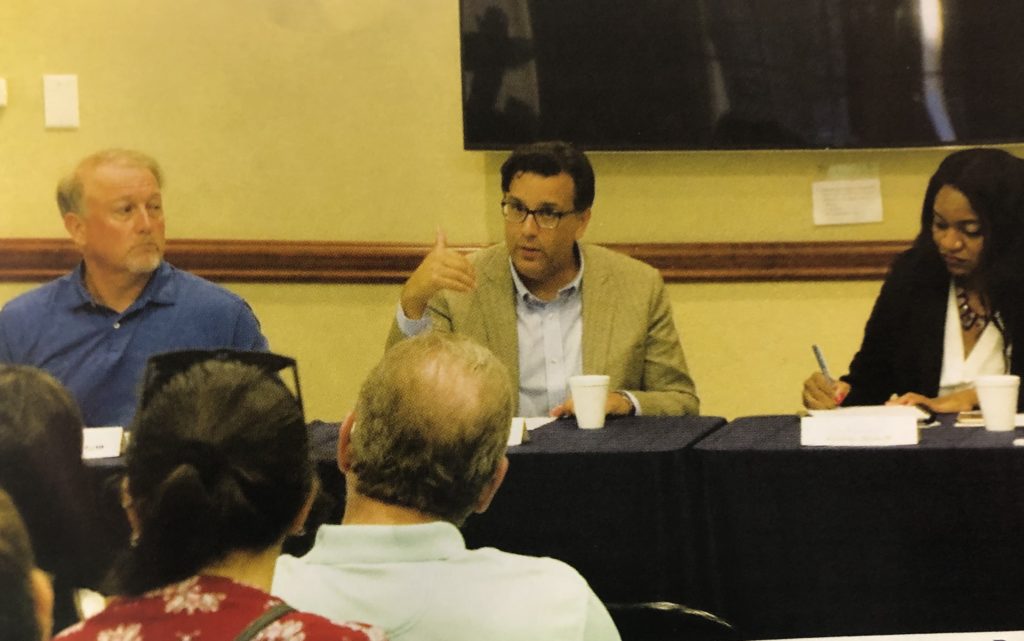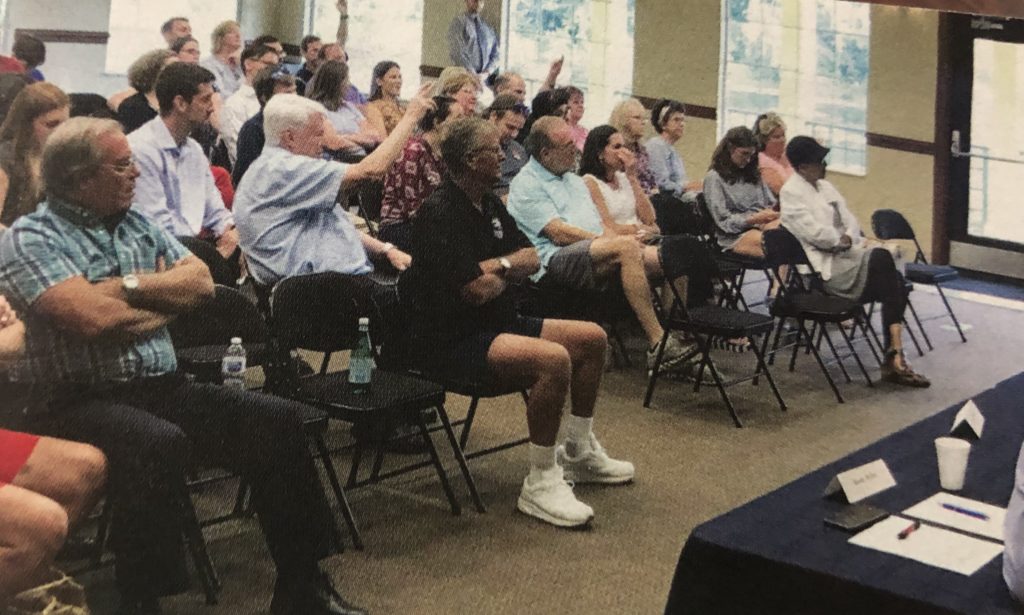
In order to begin a study by students in Master’s degree programs at the University of South Florida as to why so many businesses have exited New Tampa the last few years, USF helped organize a unique meeting on July 16, featuring a panel of elected officials and local business owners.
The meeting was Phase 1 of the USF group’s efforts to study New Tampa’s faltering business climate as the students endeavor to figure out what, if anything, can be done to stem the business red tide.
A panel that consisted of the director of the USF School of Public Affairs (where the Master’s degree candidates are studying) Ron Sanders, Rotary Cub of New Tampa past president Karen Frashier, Oliver’s Cycle Sports owner Randy Myhre and three local elected officials (see below) was greeted by a packed house of spectators (who were mainly New Tampa residents; see photo on next page) at the meeting, which was held at Compton Park in Tampa Palms.
Hillsborough County District 2 commissioner Ken Hagan, District 7 Tampa City Council member Luis Viera and newly elected District 63 State Rep. Fentrice Driskell agreed to be on the panel because all of them share concerns about why major companies and mom-and-pop businesses alike are having so much trouble surviving, much less thriving, in zip code 33647.
Sanders said that the study is being conducted by USF students seeking their Master of Public Administration (MPA) degrees in either Urban & Regional Planning or Public Affairs, after then-mayoral candidate (now Tampa Mayor) Jane Castor campaigned in New Tampa.

Castor said many local residents asked her why the business climate in zip code 33647 seemed so poor, especially when compared with the booming economy in Wesley Chapel, just to New Tampa’s north, on Bruce B. Downs (BBD) Blvd. and S.R. 56.
One of those Castor was talking to just happened to be Sam Becker, a graduate assistant in the School of Public Affairs, and she asked Becker to look into what, if anything, USF could do to help her figure out what could be done to help New Tampa’s businesses. By the time Castor was elected in March, the wheels were already in motion.
“This meeting is the kickoff to Phase 1 of the study — to meet with the community,” Sanders said at the meeting. “Phase 2 will be individual interviews with community staples — elected officials, business owners and residents — such as those in this room. In Phase 3, the students will look at the literature (facts and figures) and the (business) practices going on in the area. For example, is (New Tampa’s situation) just part of a national phenomenon or are there local factors” causing our area’s economic gloom (or both)?
Although Hagan, Viera and Driskell all agreed that the meeting was important, there didn’t seem to be too much help for the USF students coming out of this first get-together.
Among the factors pointed to as to why so many businesses have closed in New Tampa were the high rents, the lack of tax incentives to open major businesses, and even some things brought up by Frashier and Myhre.
Frashier, who also is the co-chair of the Taste of New Tampa & Wesley Chapel, mentioned that New Tampa doesn’t have a large enough gathering place for major events, such as the Wiregrass Wobble 5K road race her club hosts (at the Shops at Wiregrass) every year on Thanksgiving morning, or the Taste (held at AdventHealth CenterIce), “So, we have no choice but to put on these events in Wesley Chapel.”
Hagan and Viera both touted the new Village at Hunter’s Lake development that will be home to a 20,000-sq.-ft. New Tampa Cultural Center, as well as several unique restaurants and retailers (as we reported last issue), but that those are all coming online in 2020 or even 2021.
Myhre said he thinks that bicycle paths connecting the subdivisions in New Tampa would make getting to and from local businesses easier, without having to drive a car, but Hagan said, “Connecting communities is great, but have you seen how hard it is to get even one road connected between communities?” — an obvious jab at the whole Kinnan St.-Mansfield Blvd. flap between Hillsborough and Pasco counties.
Residents at the meeting also brought up how long the widening of BBD in New Tampa took, which affected local businesses, while one noted that S.R. 56, where so much of Wesley Chapel’s growth is taking place, currently has very few residences directly off of it. No one came up with any reason why this helped or how it has affected the economy in the Wesley Chapel.
For New Tampa’s businesses, the hope is that more answers will come out of Phases 2 & 3 of the study.








